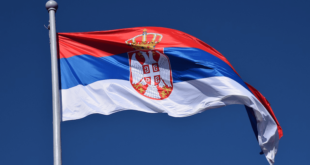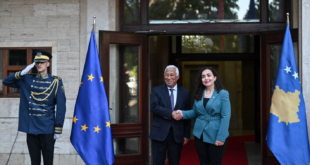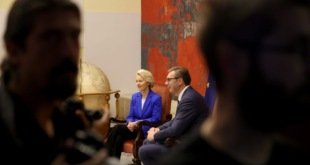Kosovo Prime Minister Hashim Thaci called for a ‘dignified celebration’ of the International Court of Justice’s ruling in favour of Pristina’s declaration of independence as protesters gathered in the flashpoint town of Mitrovica.
Some 600 demonstrators marched in the north, Serb-majority, area of the divided town after the announcement of the ICJ’s decision late this afternoon.
Most, Kosovo police said, have now dispersed, but some 30 individuals remain close to the main bridge over the river Ibar, which has been the scene of major clashes between ethnic Albanians and Serbs since NATO’s 1999 invasion.
In a surprisingly strong and much awaited decision, the International Court of Justice found today that Kosovo’s declaration of independence did not violate international law or UN Resolution 1244, in a ruling that could have a far-reaching impact in other parts of the world.
Ten judges on the top UN court voted in favour of the advisory opinion, including the president of the court. Four judges voted against, with one abstention.
The court began reading out its advisory opinion at 3pm today, while Balkan Insight was first to reveal the court’s ruling in favour of Kosovo at 2pm, 10 votes for and four votes against.
Earlier today two well placed sources told Balkan Insight that nine out of 14 judges considering the International Court of Justice’s case on whether Kosovo’s declaration of independence was legal voted in favour of the view that the move ‘does not run counter to international law’.
One international source told Balkan Insight that Belgrade had been informed yesterday, and was prepared for the news.
After Kosovo’s ethnic Albanians declared unilateral independence in February 2008, Serbia, which bitterly opposes the independence declaration, took the case to the International Court of Justice, ICJ. Hearings in the case lasted from December 1 to 11, 2009, and the court announced that it would deliver its non-binding advisory opinion today.
After the announcement, a glum faced Serbian Foreign Minister Vuk Jeremic said that Serbia would maintain its position and would never recognise Kosovo’s independence.
He said that the most important thing at the moment is to preserve peace and stability in Kosovo.
According to Jeremic, Serbia’s politics on the issue will remain the same. “It is a peace-loving policy which is based on the principles of international law, and we have not heard in the courtroom today if anyone had the right to secede. This debate is a political debate and it will obviously be led in the General Assembly,” he said.
The mood was very different among Kosovo politicians, who claimed the ICJ’s decision was historic.
Thaci said: “We expect new recognitions, the strengthening of our state, we expect to secure visa liberalisation, we expect a more positive progress report and we expect to secure an EU perspective.
“We knew how to win the war, we knew how to build democratic rule and achieve the declaration of Kosovo as an independent and sovereign country, now it’s time to continue with work on economic development, create new jobs, continue with reforms in health and education.”
Kosovo’s President Fatmir Sejdiu said that the state of Kosovo proved to be an important factor of stability in the region and a success story.
He added that Kosovo has always been convinced of its right to independence and the ICJ’s opinion has proved clearly the facts.
Sejdiu said that Kosovo will continue to offer to Serbia the option of ‘good neighbourly relations’.
Suzana Grubjesic, of the G17 Plus party in Serbia’s government coalition, told Beta news agency that the ICJ advisory ruling is another in a series of precedents in international law and will have consequences for international order, as well as encouraging different secessionist movements around the world.
The leader of the Serbian Progressive Party, SNS, Tomislav Nikolic, told reporters that the ICJ’s decision was “fatefully bad” for Serbia.
But the leader of the Serbian Renewal Movement, Vuk Draskovic, believes that the court’s opinion should be treated with respect.
“In cooperation with the EU and the international community, and not in conflict with them, and with the authorities in Pristina, it is possible for the Serbian people in Kosovo to be economically, culturally and spiritually linked with Serbia,” Draskovic said in a written statement.
Catherine Ashton, the EU foreign affairs chief, said in a statement: “The EU welcomes the publication of the advisory opinion of the International Court of Justice. We are studying it with great care.
“The advisory opinion opens a new phase. The focus should now be on the future. The future of Serbia lies in the European Union. The future of Kosovo also lies in the European Union. This is in line with the European perspective of the region and the relevant Council conclusions…”
US State Department spokesman P.J. Crowley called “Europe to unite behind a common future”, in reference to the five members of the EU which have so far failed to recognise Kosovo.
The impact of the decision is already being felt in Bosnia, where it is feared that Kosovo’s declaration of independence could inspire the Bosnian Serbs living in Republika Srpska to secede from the state.
The speaker of the Bosnian Serb parliament Igor Radojicic said that the ICJ’s ruling was “disappointing”.
“The explanation given today leaves the impression that politics prevailed over legality,” he said.
The president of the Bosnian Serb Socialist Party, Petar Djokic, said that the ruling was more a result of “power and influence of major world powers than of international law”.
“This is an important experience and we will see what will be its results in the future”, he said hinting at the potential impact on the Republika Srpska.
Bodo Weber, a Berlin-based analyst with the think-tank Democratization Policy Council, told Balkan Insight that Serbia may now be forced to make concessions over Kosovo.
He said: “Since Kosovo’s declaration of independence, the EU and Serbia have engaged in a kind of game of mutual self-deception. The EU has pretended that accepting Kosovo’s independence is not a condition for a Serbian EU-membership, hoping the Tadic government would eventually accept the new reality, while it has offered Belgrade an opportunity to escape hard decisions and deceive their citizens into believing that they could have both the EU and Kosovo.
“With an advisory ruling of the International Court of Justice on Kosovo’s independence…that game has come to an end. The Western policy of ‘hope is our plan’ has reached its limits.
“Yet with the surprisingly clear ICJ ruling the court may very well have saved the EU from its own ‘incapabilities’: the ruling leaves Belgrade without a legal argument for their case, it is hard to see how they could bring it to the UNSC now.”
 Eurasia Press & News
Eurasia Press & News



